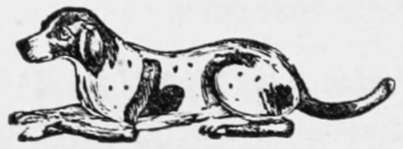Origin Of The Different Breeds Of Dogs
Description
This section is from the book "Breeding, Training, Management, Diseases Of Dogs", by Francis Butler. Also available from Amazon: Breeding, training, management, diseases.
Origin Of The Different Breeds Of Dogs
Tins is rather a hard subject for a discourse; such is the diversity of opinion, in regard to the prime origin of the different shades of Dogdom. There being nothing more than an almost imaginary circumstantial train of doubtful evidence, to substantiate a variety of suppositions, we are left somewhat in the dark as to the peculiar varieties of the parent stock. From a lengthened experience in obtaining crosses of different breeds, and from a thousand instances L have witnessed of the varied products of untraceable mongrel stock; from the incredible changes which climate affects even on the same generation, I am inclined to believe that many breeds, now considered as genuine, might be again reproduced from opposite races. I believe this, because I have often proved it there are. however, some races which bear more the impress of originality than others, both in their outward appearance, and in their instinctive propensities. The courage of the Bull-dog ; the fleetness and sight of the Greyhound ; the game hunting attitudes of the Pointer ; the long curly ears of the Spaniel; the peculiar drooping ears of the Hound. These and other examples of peculiarities of physical structure, and native properties, lead us to infer an originality of caste. But from these few only, which I have mentioned, what an infinite variety may be propagated ! The Hound with a Spaniel, and the offspring crossed by a Pointer would certainly be running great risk of producing a Setter. The Setter thus formed, crossed by a Bull-dog, might turn out some tolerable fair Terriers. Thus, by the blending of different stamps of animals, there is scarcely any limit to strange productions. Add to this, the effects of habit, diet and climate, and it is easily conceived how every generation is introduced to a novel canine race, of which our ancestors had never dreamed. An animal not only changes his appearance to suit the climate he may be called on to inhabit, but moreover, his very instincts are forced into that particular channel, best adapted to the life he has to lead. Like man himself, he is in a great measure the creature of circumstances, and his peculiar attributes and acquirements &re to a certain extent hereditary, as well as his snub nose, curly ears, or spindle shanks. The effects of climate on animals are really astonishing. Witness only the Merino sheep in Cuba ; the Norman horse in London ; compare the fur of the fox or rabbit in different latitudes, and you will be convinced what a variety of changes may be thus produced on the animal system. This, together with the constant introduction of new stock into almost every country, will account in a great measure for the numerous varieties and sub-varieties of the canine species. The breeds best known and most in use in this country, are the Pointer, Setter, Spaniel, Fox-hound, Beagle, Greyhound, Bull-dog, Bull-terrier, Scotch and English Terrier, Newfoundland, St. Bernard, Scotch and English Shepherd-dog, Poodle, etc. From these alone, only imagine what an endless transmogrification might be effected! Some of these make good cross breeds, particularly the St. Bernard and Newfoundland. This amalgamation adds to the beauty of the St. Bernard, and to the size of the Newfoundland ; and, I think is the happiest mixture for an imposing and trustworthy family watch dog, Nevertheless, as this is the only cross I care about, I shall not enlarge on the subject; in other cases I prefer the pure stock, as far as it can be depended on. unless a cross be persisted in, until it turns out to suit one's purpose. Nevertheless, a little Hound in the Pointer, a little Spaniel in the Setter, etc., if judgmatically infused, may serve to arouse the dormant energies of an out-bred stock, and impart new vigor to a novel procreation. In fact, no breed can be sustained, without an occasional sprinkle of foreign blood, except, at the risk of sacrificing health and strength, and of eventually dwindling our chosen ones to perfect nonentitiesóweak, puny, lifeless, worthless.

Continue to:
- prev: Newfoundland Dog
- Table of Contents
- next: The Bloodhound
